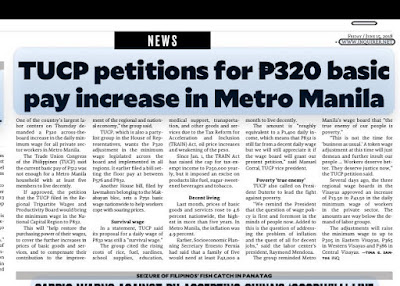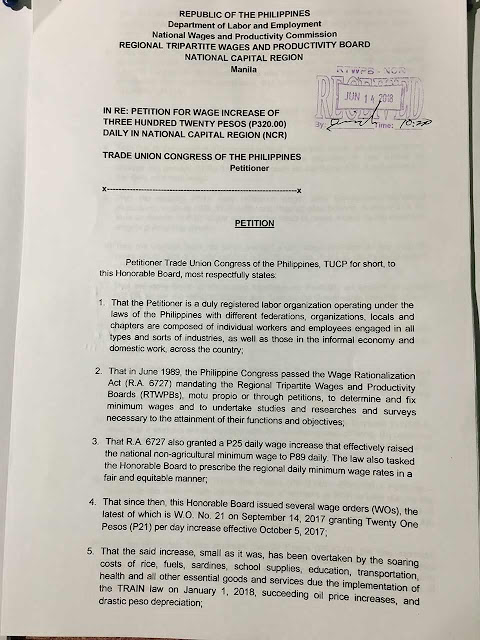DESPITE recent wage increases in 12 out of 17 regions, organized labor groups remain confident that the proposed P150 across-the-board legislated wage hike will be enacted into law.
The Trade Union Congress of the Philippines (TUCP) and the Federation of Free Workers (FFF), two of the country's biggest labor organizations, said they were optimistic about the passage of Senate Bill (SB) 2002 after the Senate Committee on Labor and Employment wrapped up the work of the technical working group.
SB 2002, authored by Senate President Juan Miguel Zubiri, calls for a P150 across-the-board increase in the minimum wage of workers in the private sector across the regions to cushion the impact of surging price spikes, which greatly diminished the take-home pay of minimum wage earners.
"TUCP stands in resolute support of Senate Bill 2002, which advocates for an across-the-board P150 wage increase for workers nationwide, as the Senate Committee on Labor and Employment wraps up the work of the technical working group (TWG) where TUCP consistently and actively participated in," said TUCP Vice President Luis Corral.
"Senate Bill 2002 is a beacon of hope for our workers, offering not just a financial reprieve but a tangible recognition of their invaluable contributions to our society. The proposed across-the-board P150 wage increase is not merely a matter of economics, but of simple justice, common fairness and respect for the worker that sustains our nation's progress," he added.
FFF President Sonny Matula said that while they appreciate the wage hike increases in 12 of the 17 regions of the country, the wage orders issued by the Regional Tripartite Wages and Productivity Boards (RTWPB) were not enough or insufficient as they failed to address the glaring wage disparities among regions and within the agricultural sector, adding that the wage disparities perpetuate discrimination and hinder economic inclusivity.
"If the Senate and the House can act on the P150 across-the-board wage increase, it would be a significant help for ordinary workers, as it will boost the economy, particularly in rural areas," added Matula.
A counterpart measure, House Bill (HB) 7871, or the "Wage Recovery Act of 2023," has also been filed by House Deputy Speaker Raymond Democrtio Mendoza,
HB 7871 is meant to address the steady decline in the real value of wages due to surging inflation. It has already been approved at the committee level.
Corral said SB 2002 and HB 79871 represent a crucial step in addressing the pressing needs of the labor force, fostering a more equitable economic landscape, and addressing the growing gap between increased labor productivity and stagnant wage levels.
Corral said SB 2002 and HB 79871 represent a crucial step in addressing the pressing needs of the labor force, fostering a more equitable economic landscape, and addressing the growing gap between increased labor productivity and stagnant wage levels. - By William B. Depasupil / The Manila Times

















